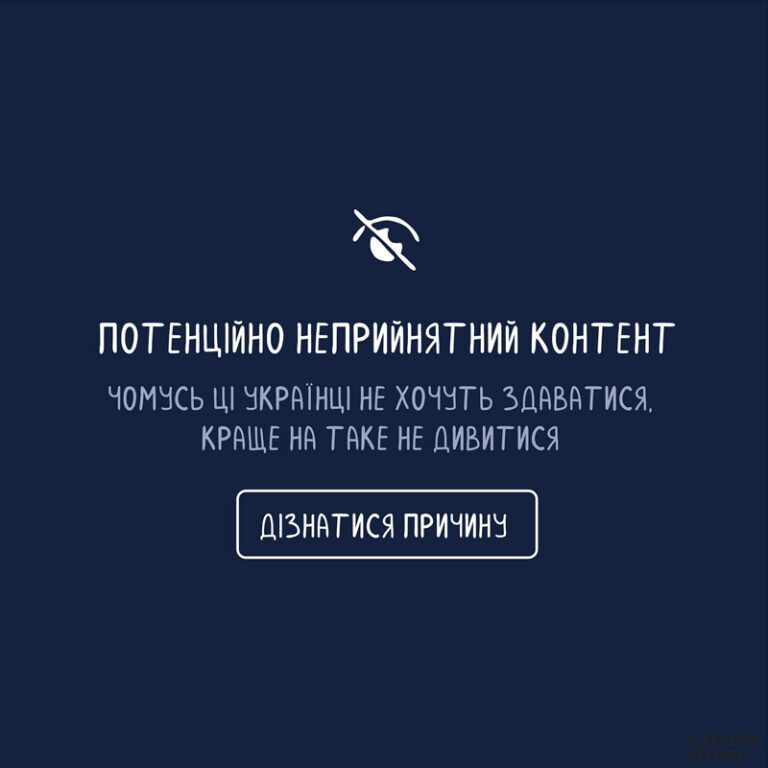
The algorithms of the most popular social networks went crazy at the start of Russia’s full-scale invasion of Ukraine. Now, algorithms seem to constantly limit the content about the Russian-Ukrainian war, accounts of Ukrainian activists get deleted, and at the same time algorithms react and boost the Russian propaganda posts. As a result, it becomes increasingly more difficult for Ukrainians to post about the war crimes committed by the Russian army on the territory of Ukraine.
!
The article contains links to Russian websites. These can be viewed via VPN.We collected various examples of mass removal of posts due to “sensitive nature”. In this material, we outline how regular users, businesses and media deal with such situations, and we will tell you what to do if your content gets screened by the various platforms’ digital judges.
This happened before
This is not the first time Ukrainian users have been the victims of blocking by the social networks. At the beginning of the Russian-Ukrainian war, in 2014, multiple users reported that their accounts were blocked due to the attacks by the pro-Kremlin bots. This was confirmed in 2017, by the former U.S. State Department’s Deputy Assistant Secretary for Digital Strategy, Moira Whelan. Three years prior to that, Ukrainian Facebook users collected likes to get an answer from the head of the platform, Mark Zuckerberg, regarding the opening of Facebook’s Ukrainian office, as well as to shine light on the legality of the restrictions imposed on the Ukrainian segment of Facebook. Only five years later, in 2019, Facebook finally appointed a public policy manager for Ukraine.
Although, it is important to clarify that Facebook’s operating principles do not define running any national or regional offices. The fact that Ukraine received its public policy manager (responsible for Central and Eastern Europe) is a precedent that became possible thanks to the publicity of the problem and active advocacy by Ukrainian media lawyers.

The restrictions on social networks reached the point of absurdity in 2015. For example, a user reported that Facebook banned him from posting a quote from the poem by Taras Shevchenko: “Make love, oh dark brow ones, just not with Moscovites” During the following years, users were repeatedly banned for using the word “Moscovites”. Facebook’s rules clearly condemn hostility and hate speech; and bot-farms track such words (for example, designation of a certain subset of people) and raise red flags.
The vocabulary of hate speech and hostility is a rather debatable issue. According to the logic of Meta Corporation (the parent company of the platforms such as Facebook, Instagram and WhatsApp) , there is a number of geographical names and locations that hurt the feelings of certain groups of people or are designated as the words of a “sensitive nature”. For instance, there exists a village of Moskali in Ukraine, Katsapka Lake in Poland, and in Russia – the village of Khokhly. It seems that Meta’s logic breaks down with these examples. The Meta company recognizes that regional and linguistic peculiarities of word usage are important in the context of the geopolitical situation, where the same terms can be interpreted both neutrally and as hate speech. The platform will keep them in the first case, and delete them in the other. On the upside, Meta monitors how the usage of the “sensitive” words evolves and changes, and admits that it sometimes applies its policies in error.
A lawyer at the Center of the Democracy and Rule of Law (“Tsedem”), Ihor Rozkladai adds:
— So far, the EU Digital Services Act is the earliest document on the timeline that will regulate online players in a certain way. It is already at the final stage of approval. This document will introduce basic requirements for the operation of online platforms, removal of content, submission of complaints and appeals. However, it will not solve the problem of war content.
I call on Ukrainian philologists and linguists to do a semantic analysis of the words regularly and stubbornly blocked by the social media platforms. It is necessary to professionally differentiate which terms are appropriate and which aren’t ; based on that, the platforms should be offered to review that vocabulary.

Quoting classics can get you blocked for other reasons, apart from the usage of the word “Moscovite”. For example, in September 2021, Olena Pavlova, the author of the famous cartoon character Inzhyr The Cat, was blocked by Facebook for illustrating Ukrainian Literary classics with the caption “Read classics, like cats.”
Inzhyr The Cat
A comic character and a fictitious cat that loves books, actively reacts to the events in society and has personal pages on social networks.In recent years, Facebook and Instagram seem to block Ukrainian voices, and not just the posts expressing the hatred toward the Russian aggressor. They also seem to block pages for publishing allegedly personal data that violates community guidelines. The Ukrainian Facebook community has several specific examples of unjustified blocking; appeals for reversal were unsuccessful. . For instance, one of the largest Lviv Facebook groups, “Lyudonky, advise” (360k users at the time), was blocked for unknown reasons on June 15, 2021. Another example involves, one of the largest Kyiv online communities, “Na Teremkakh” (over 31k users at the time of blocking). The page was banned on December 2021 for posting an image of a lost and found document, in order to try to help identify the owner. Violation of privacy was cited even though group’s administrator, Mr. Bohdan Gdal was aware of the privacy concerns and reiterated that he was careful to blur out any identifiable markers and personal data on the image.The page was never reinstated.
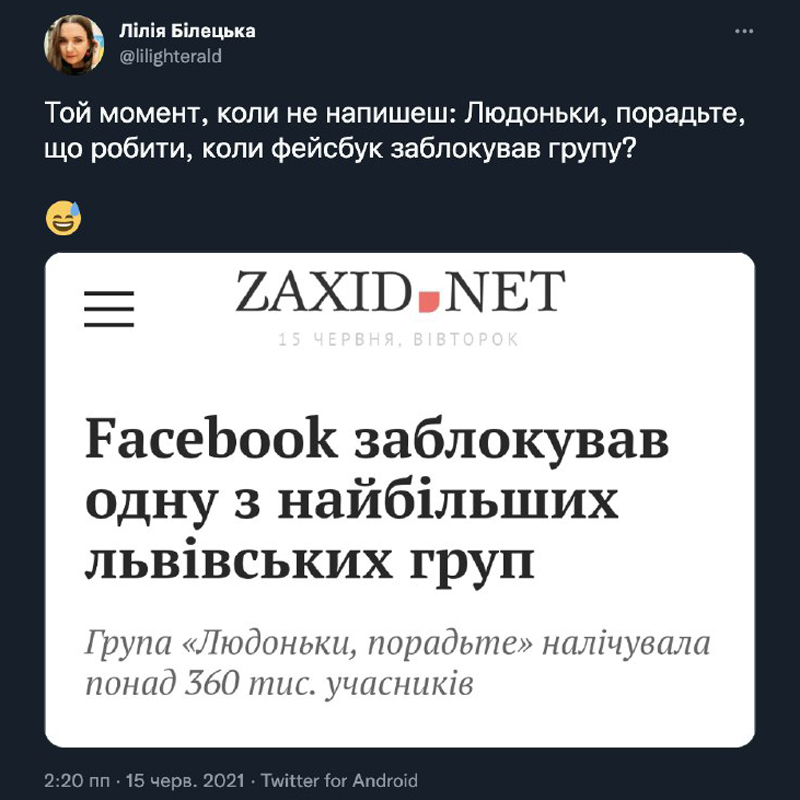
Digital care of Ukrainians
A new wave of content blocking began when Russia invaded Ukraine on February 24, 2022. Ukrainians generated and continued to generate an insane amount of content, which was not only a reflection of all ongoing events, but was also a way to carry out an information fight against the Russian invaders. However, even before the invasion, there were precedents of restrictions of some users. For example, Twitter reported that on February 23, 2022, it mistakenly suspended the accounts of several OSINT reporters who posted about the buildup of the Russian military forces near Urkaine’s borders. One of the reporters was Kyle Glen, the co-host of The OSINT Bunker podcast. Roman Burko, the founder and volunteer of the Ukrainian project “InformNapalm” was also suspended. Both journalists reported that their accounts were heavily targeted, possibly by the Kremlin bots, for publishing their investigations of the fakes of Russian propaganda.
OSINT
Open-source intelligence is a method of collecting and analysing information from open sources.
Reacting to the events of the morning of February 24, Facebook and Twitter initiated a digital blitz-enlightenment of Ukrainians who awakened to martial law. Twitter Safety published a thread with tips on how to secure accounts if users were unsure of the security of their information. “When using Twitter in conflict zones or other high-risk areas, it is important to be aware of the ways to manage your profile and digital information”, the post stated. The tweets went into details how users could create stronger passwords, used the two-factor authentication, make their tweets private, and turn off the geolocation sharing. The thread is available in English, Ukrainian and Russian.
Meta launched a service for the safety of Ukrainians that allowed users to restrict others from viewing their Facebook page and content with one click. Also, on the night of February 23-24, the company started the Special Operations Center that responded to actions on the platform in real time.
A temporary right for hatred
Considering the wartime circumstances in Ukraine, Meta tried to adapt a content policy built around the concepts of political neutrality.

In response to numerous statements from the Ukrainian government, the public and, in some cases, their own employees, the international platforms rewrote their policies in March 2022 to battle the Russian propaganda and protect Ukrainians online. In particular, the accounts of the Russian state-run media such as Russia Today, which had a huge number of followers on various online platforms worldwide, were blocked and their ratings lowered. Taking care of security and minimising the amount of misinformation, Instagram began to hide information about subscriptions and shared subscribers of the users from Ukraine and Russia. This option also hid the profiles of Russians who were sanctioned for supporting the war and Putin’s regime from the view of the Ukrainian Instagram users.
In addition, Meta company temporarily allowed Ukrainian users to express their emotions about the Russian occupiers in March of 2022. The phrase “death to the Russian invaders” was temporarily removed from the prohibited list of violent expressions. These changes were announced by Reuters for the first time with a reference to the internal emails to the content moderators. It was temporarily possible to publish messages wishing death to Putin or the Russian military on Facebook and Instagram. The permission was given to users from Ukraine, Armenia, Azerbaijan, Estonia, Georgia, Hungary, Latvia, Lithuania, Poland, Romania, Slovakia and even Russia. However, this gesture was, of course, appreciated on the territory of the aggressor’s country as well, with the waves of outrage and calls for bans on the social networks, labelling them as “extremist”. The Embassy of the Russian Federation in the USA published an indignant tweet and called to “stop the Meta’s extremist activities and the need to take measures to bring the perpetrators to justice”. In addition, “Roskomnadzor” imposed sanctions against Facebook and Instagram.

Within a month, when Ukrainian users began to post about the atrocities of the Russian military in Bucha, the Meta company returned its restrictions related to the list of violent expressions.
“Twitter blocked me again because they don’t want people to see murders committed by Russians. No, the social network didn’t block the accounts of the Russian propagandists and government officials who encouraged these atrocities; instead they blocked me and dozens of others who posted about it”, Petro Nek, a blogger and CMO of Lviv Online, wrote on April 5. His account was blocked for publishing photos of the dead Ukrainians in Bucha.

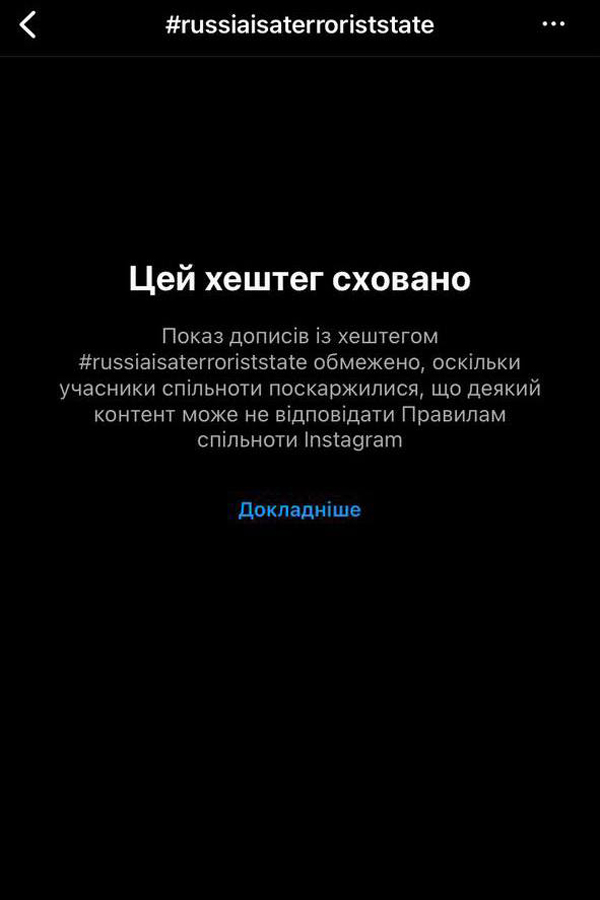
The very same day, the users reported that Instagram was restricting the #BuchaMassacre hashtag. The rules of the platform prohibited sharing scenes of violence, so posts with such a hashtag were automatically blocked. “Some community members complained that certain content may not comply with the rules,” the platform decided. However, everyone knew who these “some” were (Russians) and what was actually hidden under this “some content” (Russian atrocities). It seems that Instagram wants their audiences to continue liking cat videos, nicely presented food plates and “filtered” selfies, instead of the true horrors carried out by the Russian Federation on Ukrainian soil.
In June 2022, the situation repeated when the hashtag #russiaisaterrorisstate was censored. Users published content and tagged many posts proving the systematic targeted shelling of civilian buildings by the Russian army. At this point, Ukrainians changed the hashtag to #russiaterroriststate (without “is”) in order to bypass the restrictions and still be able to show the world what Russia was really doing. Truth was important at that very moment, because the Russian propagandists were repeatedly blaming the Armed Forces of Ukraine for their terror activities. However, the users, who used this hashtag realised that their posts didn’t show up in other users’ feeds and their content didn’t show up as new posts. Meta claimed that they did not impose special sanctions. We believe that the algorithms limited the display of this hashtag because many people who did not like the hashtag (and its message) complained about it to Instagram.
The situation with wide and often unjustified blocking of the content of the Ukrainian users escalated at the beginning of the summer of 2022. But Ukrainians never gave up. They continue trying, especially, on the digital front. Apparently, even a photo of a Ukrainian passport can be considered “potentially unacceptable content” by Instagram. Most likely, that happens because Russian users complain about that kind of post. False interpretation by the algorithms could also be the cause (such as the distribution of personal data). False algorithmic interpretation can be described as a “false positive”; time when the algorithm finds an error where there is none.
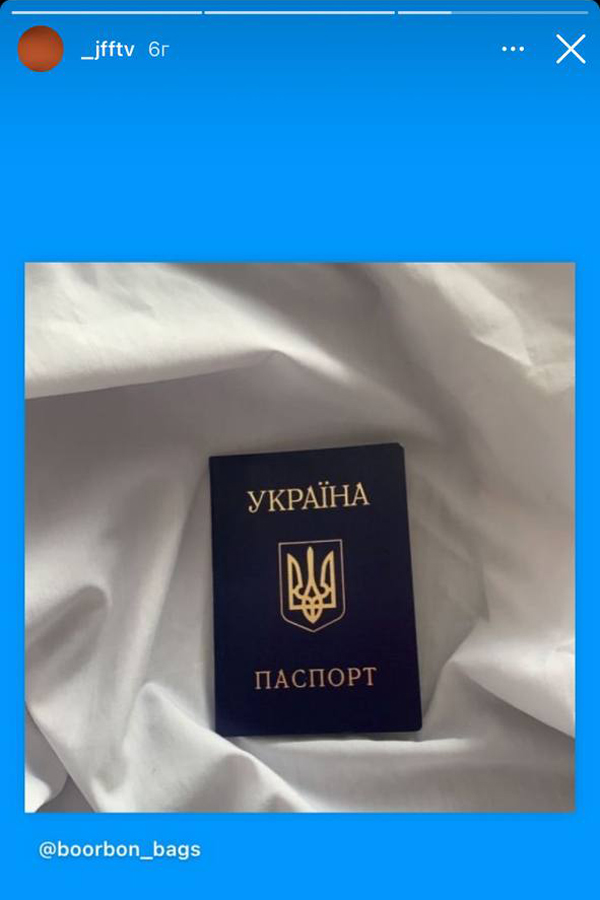
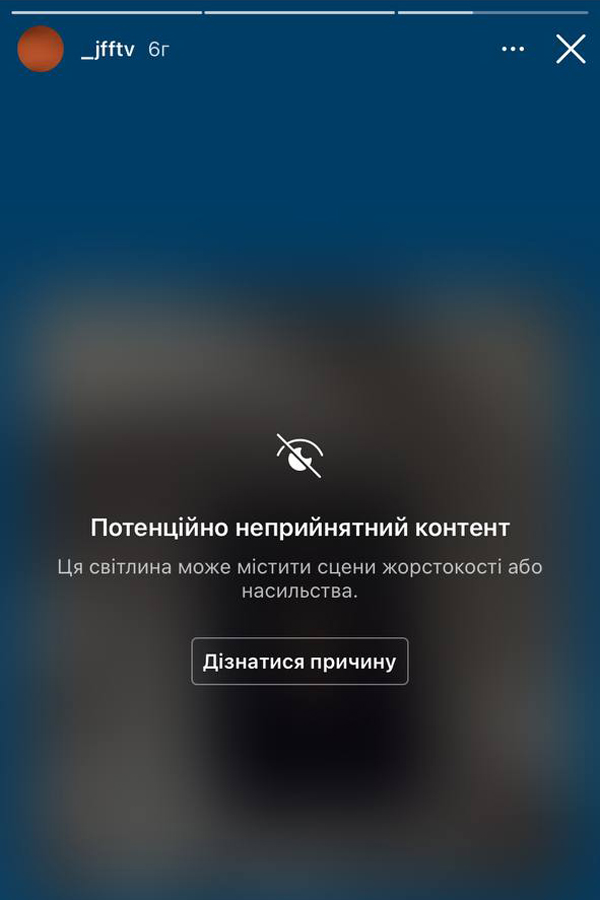
In May 2022, Mykhailo Fedorov, the Minister of Digital Transformation met with Nick Clegg, the President of Global Affairs of Facebook. They discussed Facebook and Instagram blocking of the content related to the Russian-Ukrainian war. In particular, they discussed the “Azov” regiment, which was included in Meta’s list of prohibited organizations and designated erroneously as a foreign terrorist group. This, of course, is a misrepresentation that the Russian propagandists have been working on for years in their multiple spreading of fakes. After the meeting, Mykhailo Fedorov assured: “Many decisions have already been made. There will be many decisions in the future, some in the near future. We (Ukrainians) will continue our cooperation. I am sure that there will be fewer blockings and content restrictions, and more people around the world will know about what is really happening in our country.”
On July 19, 2022, the Ministry of Culture and Information Policy of Ukraine together with the Center of Strategic Communications and Information Security (CSKIB) offered the governmental agencies and public organisations a chance to promote a unified position related to any restrictions related to the blocking of content.
Can not block all
As soon as the platforms start restricting or removing certain content the “Barbra Streisand” effect kicks in. It is a phenomenon where removal/restriction of information causes people to start spreading it even more.
That is exactly what happened with the dissemination of the quote by the Kyiv activist, Roman Ratushnyi. He died at the front and his quote became a kind of slogan and an inspiration for Ukrainians, how to deal with the Russian occupiers. “The more…”, Roman repeatedly wrote. On June 14, 2022, it was reported that Roman died. On the same day, social media users shared his words, and the platforms deleted the tweet from the serviceman’s page. This, however, did not stop Ukrainians. An army of online users began to repost screenshots with Roman’s quote as well as the text “Cannot ban everyone.” For one moment in time, Twitter feed turned into a continuous Roman Ratushnyi quote.
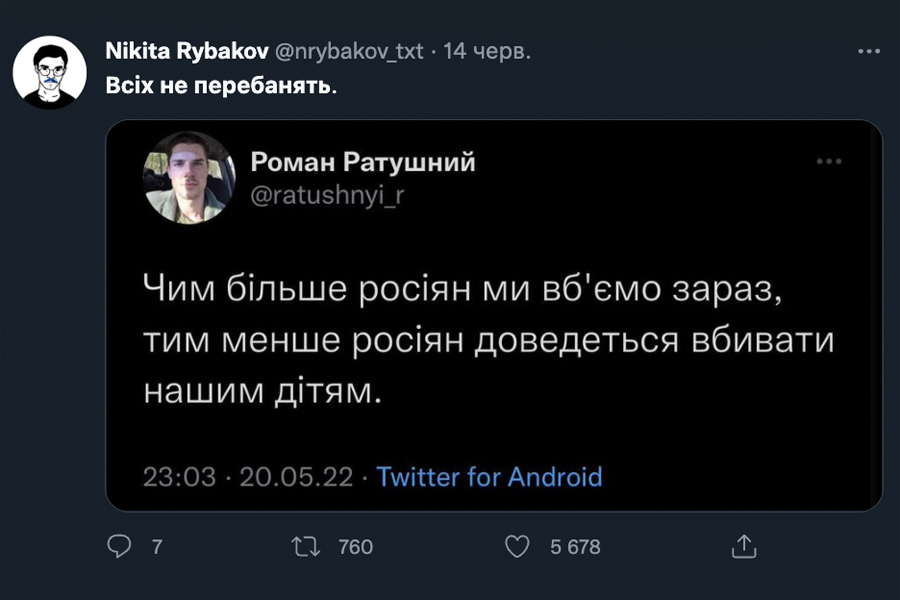
Another case is when a large number of users post similar content on the same topic or with the same exact wording. This cumulative cooperation among people occurs not only to protest removal (and censoring) of content, but is in support of blocked users, to further draw attention to the issue being silenced. Another case is when the community starts joking about something relevant.
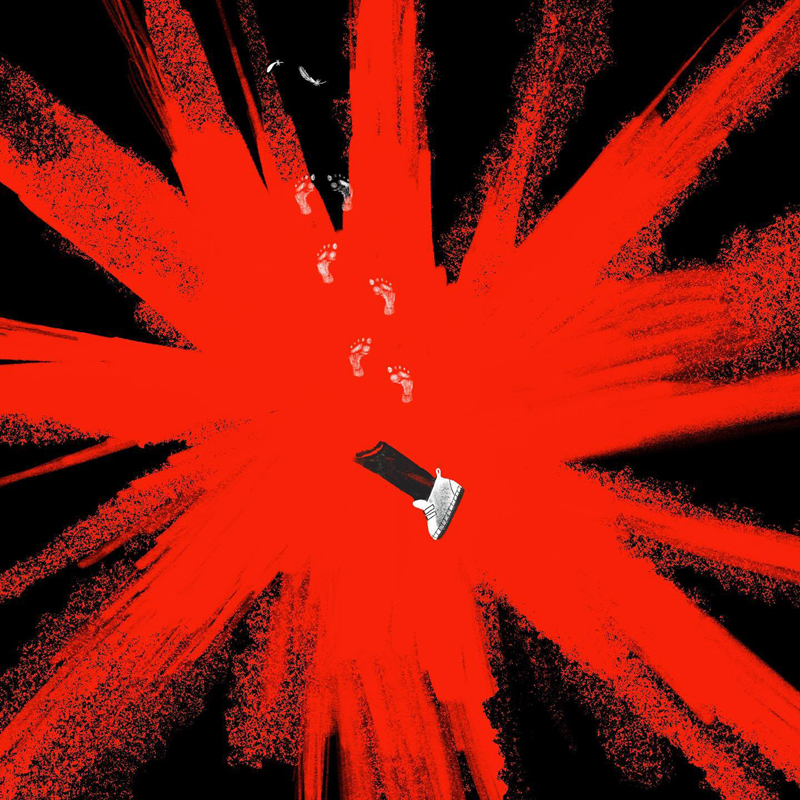
Image @shat.art88
When social networks and their algorithms mark Ukrainian war content as “sensitive”, illustrators and artists help spread the truth to the world community at large. They can freely reflect on everything that is happening in their work (drawings, gifs, videos, etc.) Artists can reproduce almost unchanged images of the killed Ukrainians or recreate Russian crime scenes on Ukrainian land. Artists’ content is much less likely to be removed from the various social networks, even if it contains the “trigger” words. The situational art takes on a dual significance: as a creative outlet for pain and outrage, and a way the artists can help document the reality of war without censorship.

Blocking activists on Twitter
Twitter blocked accounts of many Ukrainian activists, volunteers and journalists, who at the time were carrying out fundraisers for the Armed Forces of Ukraine, humanitarian aid charities or civilians affected by the war. Since April 2022, dozens of accounts have been blocked. Some users managed to “repeal” and recover their accounts, whereas others are still in cyber prisons. The following known banned accounts are:
– Yana Suporovska, journalist and volunteer;
– Roman Sinitsyn, public activist and a head of the military direction of Serhiy Prytula’s Charitable Foundation;
– Oleg Novikov, journalist and co-host of the show “Pravo na poplavu”;
– Olya Suprun, blogger and volunteer;
– Melania Podolyak, public activist, coordinator of the Serhiy Prytula Foundation in Lviv;
– Alisa Chirva, volunteer, co-founder of the “Palyanytsia” Foundation;
– Maria Smirnova, volunteer and military servicewoman;
– Julia Napolska, volunteer, SarTech project manager;
and dozens of others.
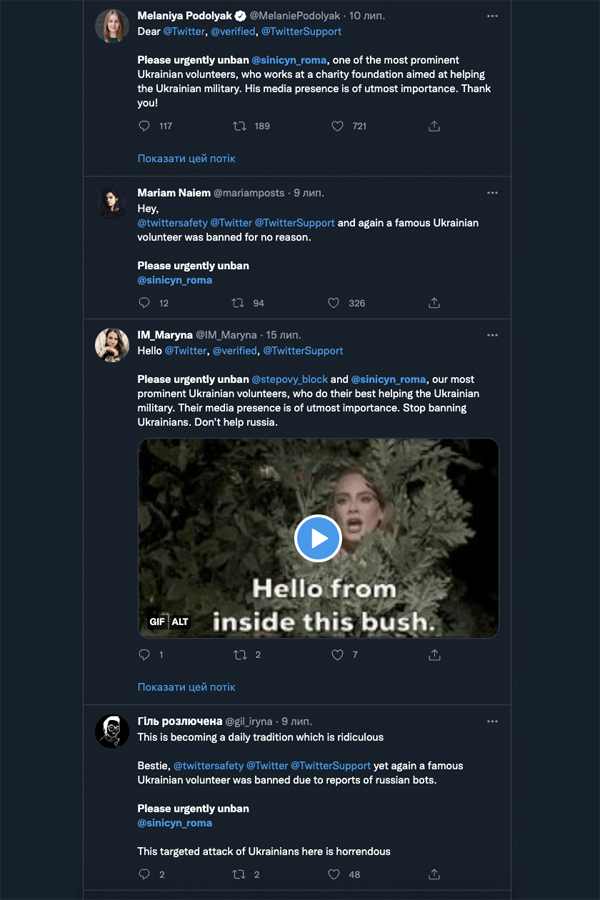
It’s worth pointing out, Ukrainian Twitter community seems to differ from the users of other social networks. As soon as the rights of one Ukrainian Twitter user (or supporter) are infringed upon, others begin to stand up and speak up about such injustices. Ukrainian Twitter base is a powerful and active online force that defends its own. Ukrainians will fight to ensure that the world is informed about the situation in Ukraine, and the crimes perpetrated by the Russian Federation on Ukrainian soil. Each time one of Ukrainian users is blocked, all other Twitter users create an upheaval on the platform with posts, re-tweets, comments and multiple unblock appeals to the moderators.
Why are Ukrainian activists, volunteers and journalists getting blocked? It seems, it could be for any reason: a photo of a crime scene, or an image of a fallen soldier. It could be as simple as someone reporting a tweet, and the account is banned. If someone finds old tweets with a card number, there will definitely be a complaint about the post. One user wrote about the fact that certain Ukrainians were harming the security of the State and they were immediately banned.
Lviv Media Forum (LMF), the Ministry of Digital Transformation of Ukraine, and other trusted partners help free Ukrainian Twitter users from the “cyber prison”. At the time of publication (July 25, 2022. — ed.), the Ministry of Statistics has been working on unblocking the Twitter account of Yevgeniy Lira, Ukrainian writer, translator and volunteer. His account was first blocked for the first time in December 2021 when he filmed the documentary “The Grave of Shadows”. Mr. Lira was also raising funds for the The Stone Tomb Museum in Podniprovia and Zaporizhzhia. That time it was blocked due to complaints about receipts. Now, during the Ukrainian-Russian War in 2022, Mr. Lira’s account is blocked due to his active volunteering. Yevgeniy is constantly raising funds for the Ukrainian military. His activism, of course, does sit well with the Russian bot farms and other detractors. The bots track down well-known activists, like Yevgeniy, with the large number of loyal followers, and pelt Twitter with a slew of complaints.
After Yevgeny was banned, multiple Twitter users sent a flood of requests to unblock his account. The extent was so great that some of those tweets went viral. One such tweet, “He’s a Ukrainian volunteer”, went viral and even trended on the platform.
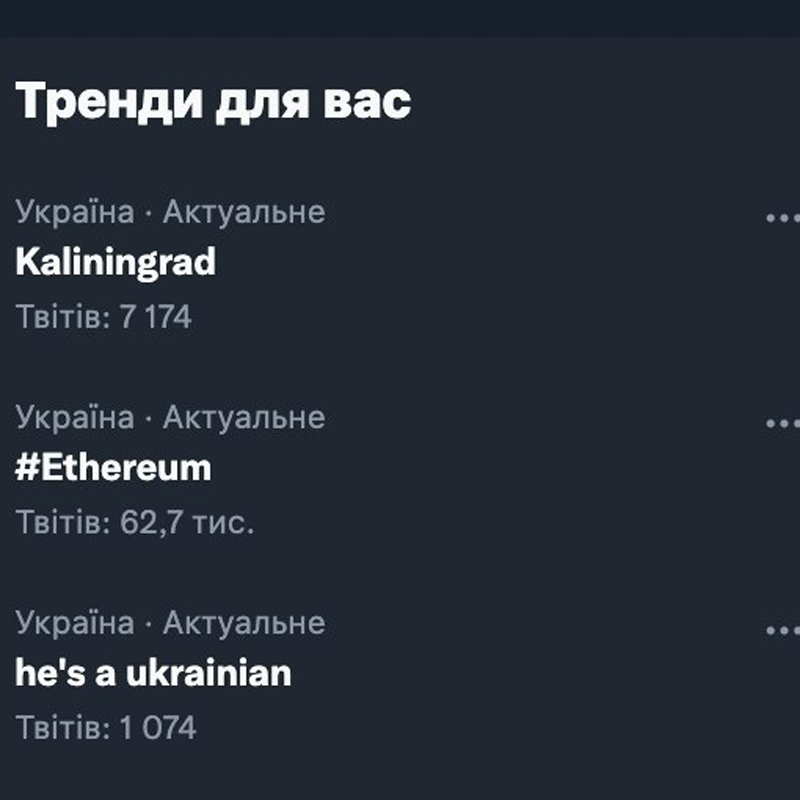
Not just activists.
The media also suffer from constant blocking of their content on social networks. For example, the “Channel 5” Facebook page was deleted in June 2022. The official reason given by the Meta company was the use of “hostile speech”. However, any speech during wartime or occupation of one’s home, uncovering of brutal atrocities and crimes committed by the Russian occupiers could be considered as “hostile”. How can one use flowery and upbeat words to describe murders and torture of innocent civilians?
The media “Groont”, which used to be a Telegram channel “Ukraine: Operatyvno”, was created on the first day of the full-scale war and sees their posts blocked almost daily. For example, social network platforms deleted their posts about “The Bloom of the Nation”, highlighting Ukrainian defenders who heroically died for their country. The reasons behind such intense moderation and scrutiny are unknown to the editors. Sometimes the team attempts to publish the same material several times so the readers have a chance to glimpse at the content. The writers are constantly trying to re-work the content to delete trigger words.
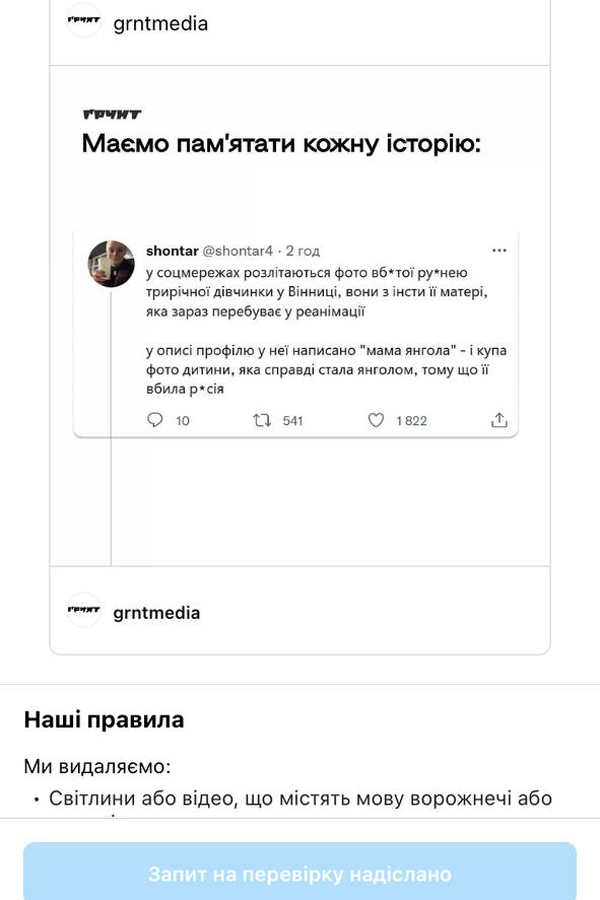
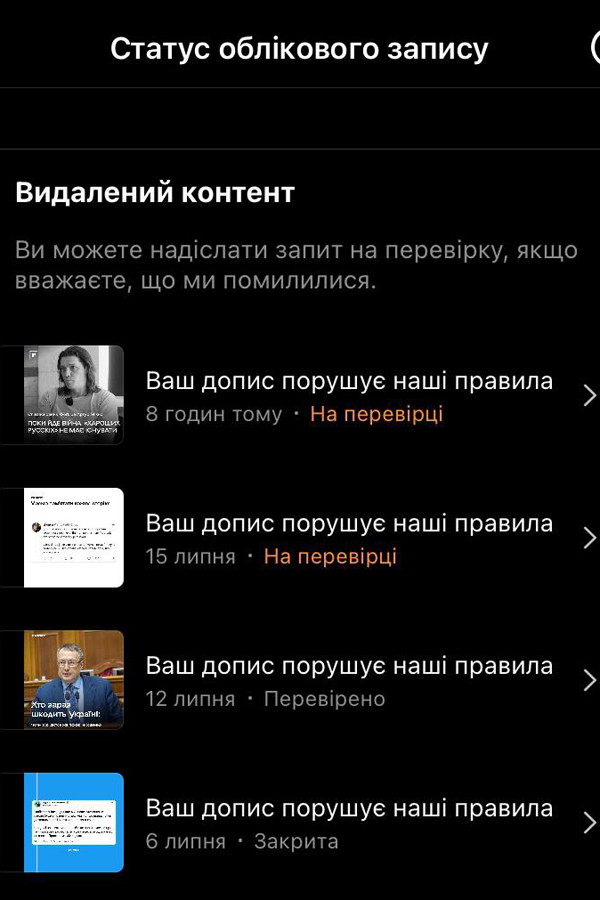
The recently-censored and deleted posts at Groont happened on Instagram. The posts were about those harming Ukraine and the need to keep telling the stories of our brave defenders. The posts did not contain any objectionable words. Any potentially triggering, for algorithms, allusions were visually censored with asterisks. The Groont media company reported that four of their posts were moderated and censored within a two-week period in July of 2022. This is a high number for a team of professionals with a publication rate of 10 to 14 articles/posts per week.
Ukrainian publications use various methods to bypass the threat of blocking. One option is to self-moderate the number of words and phrases related to the Russian Federation. If earlier in the year it was enough to cover words like “Moscovites”, “Rashists” or “Rusnia”, it is now desirable to do some sort of workaround even when mentioning the actual name of the aggressor country. The materials by Ukraїner were also repeatedly removed by Instagram for allegedly violating the community guidelines.
Another potential solution is to select a different platform for publishing “problematic” material. Most often, Twitter becomes such backup media outlet. Twitter moderation doesn’t seem to be as strict as Facebook or Instagram. A recent, and somewhat ironic, example came from the media account “Svidomi”, whose post describing Instagram’s censoring of content was censored and deleted by the platform itself.
Continuous blocking negatively affects how often accounts are presented to the readers. Account bans, sensoring and removal of posts lead to shadow bans (also known as shadow blocking). Unfortunately, users may not immediately realise that such harsh measures were taken against them. They do not receive any notifications about shadow blocking; their content simply becomes invisible to others. “Recovery” from a shadow ban can take weeks or even months.
Of course, the worst thing for the media organisation is having accounts deleted without any possibility of recovery. This usually happens after receiving several warnings from the platform.
Civil servants are not immune to account blockings or post deletions. For example, in a 2021 Facebook post, Mr. Yevgeniy Perebiynos, Ukraine’s ambassador to the Czech Republic, criticised Putin’s words about “one nation”. His post was deleted for allegedly inciting hate speech.
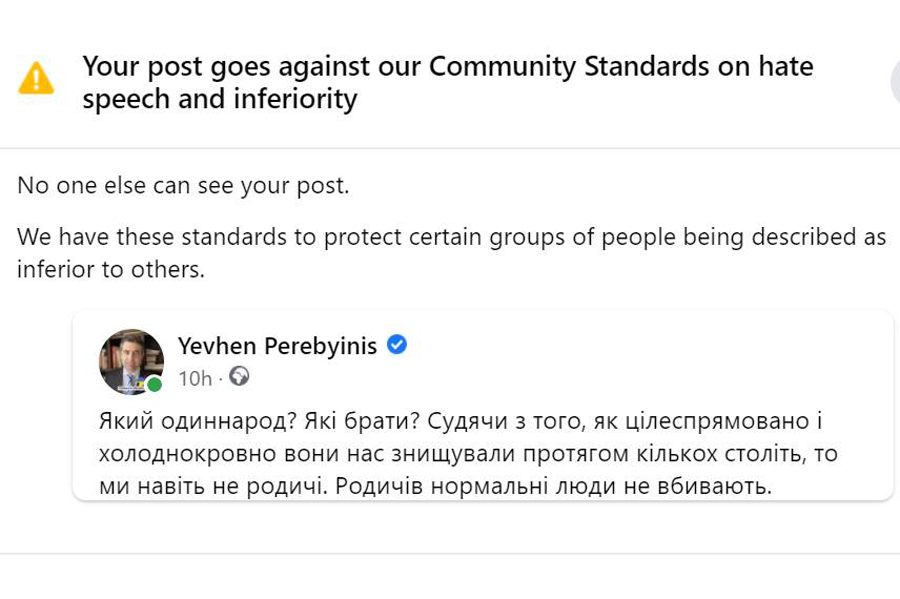
It’s Not Any Better on Other Social Networks
A heavy moderation of Ukrainian content, reporting on the full-scale war taking place in Ukraine, has reached absurdity. That time when Instagram blocked a photo with a cherry tree (an inoffensive post with beautiful images of a carousel) or marked a poem as an 18+ content. In other cases, the platforms simply limit the freedom of Ukrainian speech; this of course plays right into the hands of the aggressor country. The platforms, such as Instagram and Facebook, block Ukrainians while Russians are happily flagging more posts, thus inciting further blocking and censorship of Ukrainian content. This is one of the bridgeheads of the hybrid war when the digital attacks are intertwined with the general situation of the Russian-Ukrainian confrontation.
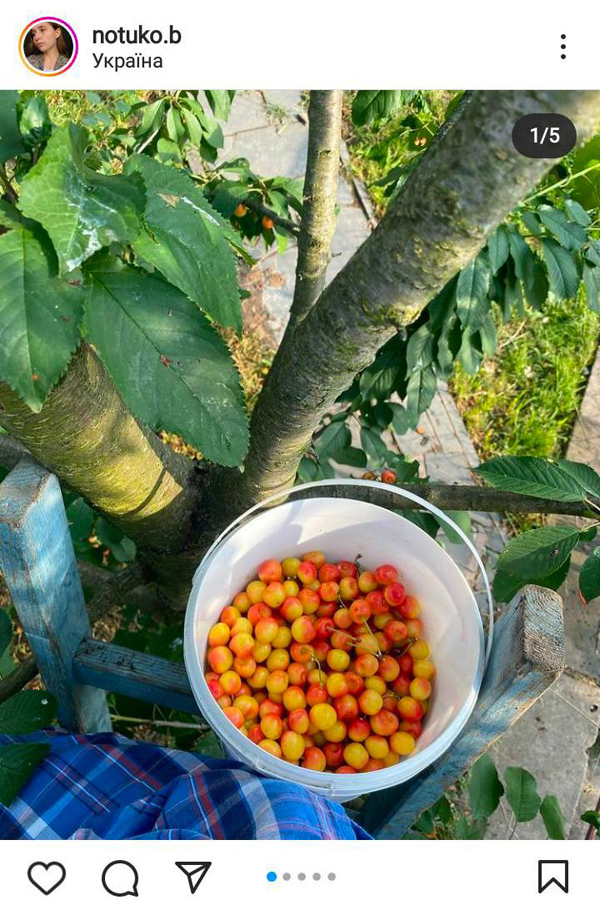
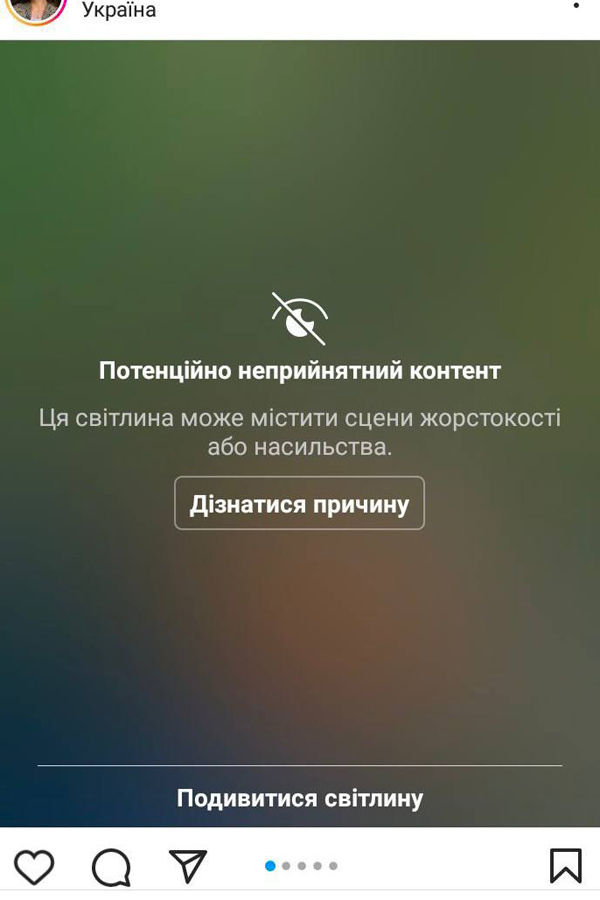
Content restrictions are not limited to Facebook, Instagram or Twitter. Ukrainian LinkedIn users complain that the social network actively blocks their posts about the war while allowing Russian propaganda to exist unchecked. Here is an example of a petition initiated to outline the various issues and confront the platform on an unfair and one-sided treatment. The complaints about the Ukrainian user accounts are usually caused by the Russian bot accounts, despite the fact that LinkedIn has not been operational in Russia since 2016. LinkedIn in Russia can only be accessed through VPN.
TikTok also removes various posts highlighting the war in Ukraine. Allegedly their rules prohibit political content. Posts depicting violence, containing “sensitive” scenes or words are also “punished” by TikTok, which quickly removes such posts from the feed.
Another telling case happened to a Ukrainian developer, Alty, who created a mobile application RKIN (from the name “Russian warship, go to…!”). The app tracked military losses of the Russian occupiers during the war. The company received a warning from Apple who demanded Alty to remove the data stating the number of eliminated Russian soldiers on the territory of Ukraine, citing it as unacceptable.
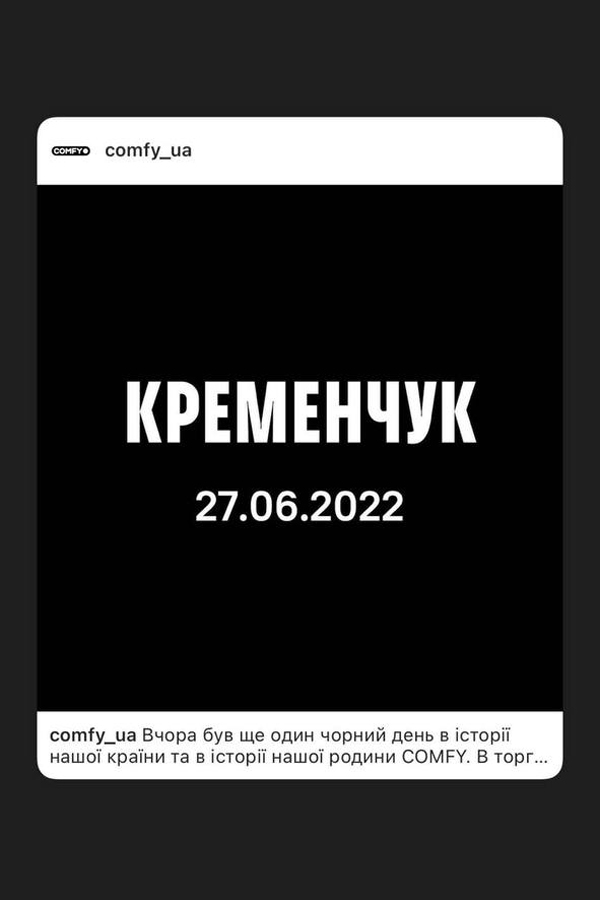
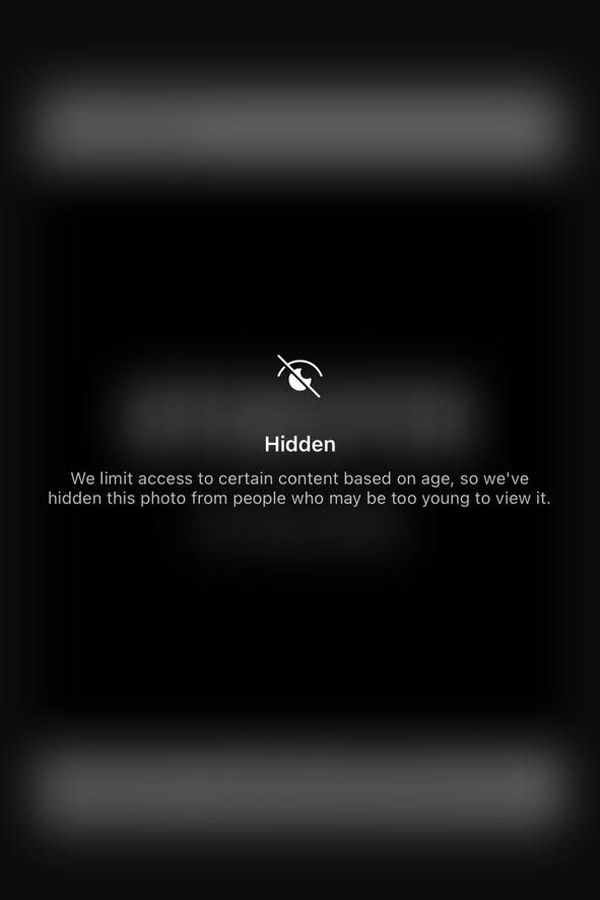
What to do, if you are blocked?
If you believe that your content did not violate the community guidelines , file an appeal. Be prepared for a long fight defending your rights.
If you received a blocking notification, follow the instructions.
The ban notice will include a link you can follow to file an appeal. You should find out what other information needs to be prepared for your post or account recovery. Usually, the social networks will ask you to provide a scanned copy of a personal identification document, as well as any arguments for your appeal.
If this does not help, seek professional help. For example, LMF helps media accounts, activists and journalists under its Emergency Media Support.
The Ministry of Digital Affairs also considers individual cases of blocking. You can apply for help by email: pr@thedigital.gov.ua.
If you did not receive a blocking notification but find yourself “the shadow banned”. Be patient and wait.
Unfortunately, there are no 100% effective mechanisms to fight such “digital sanctions”. Instagram sets and removes restrictions all the time. It is worth sending a query request to the Instagram support. Sometimes the “shadow ban” happens due to failures of the platform itself. It is advisable to periodically search for your content in the feed.(look up your content in the search engine of the social networks by searching for specific hashtags and keywords).
To avoid getting banned, carefully review your content before publishing to make sure it doesn’t violate the community standards, such as Facebook and Instagram, and Meta’s community rules.
The LMF team, which helps recover social media accounts, reminds: “remember that any words and phrases related to the Russian Federation and Russians (“Rusnia”, “Rashists”, “pig dogs”, “Moscovites” and even “ruzznya”, etc.) can be reported. Some media and users play it safe and “star” even the word “Russia”.
Twitter and Meta guidelines prohibit the publication of personal data (bank cards numbers, telephone numbers, addresses, receipts with visible bank information, etc.). If you would like to fundraise, for instance, use the Quicknote website. It helps you generate a “note” with your data for free so that you can then share the link in a tweet. Such measures will avoid content blocking and account deletion. Another option is to send payment details in private messages upon request.
If you manage to defend your account and recover it from the “cyber prison”, temporarily limit the number of readers and delete all possible trigger posts. You don’t have to fight for your profile again!
Remember about digital safety. Don’t be afraid to tell the truth. Support others in tough digital confrontations. We all need support sometimes; especially when we are revealing facts.
Since February 24, 2022, Ukraine has been suffering an unprecedented number of war crimes, the scale of which the modern world has never seen before. When social networks (Facebook, Instagram, Twitter, LInkedIn and others) sensor information about the war and Russia-caused atrocities present in the daily lives of Ukrainian citizens, the outcome is not much different from the censorship of the pre-Internet times. Modern social networks cannot be detached and neutral, as this creates an alternate information reality. We believe that these platforms must fulfil their main declared functions: help people interact, share important news and participate in social activism.
Victory in a hybrid warfare is won on the real as well as information fronts; social media is a weapon available to everyone. The world needs to hear from Ukrainians during this difficult time. More information and truth telling will shine the spotlight on the atrocities carried out by the Russian Federation on the Ukrainian soil. We all need to do our part to help stop and ensure a punishment of the aggressor country.

